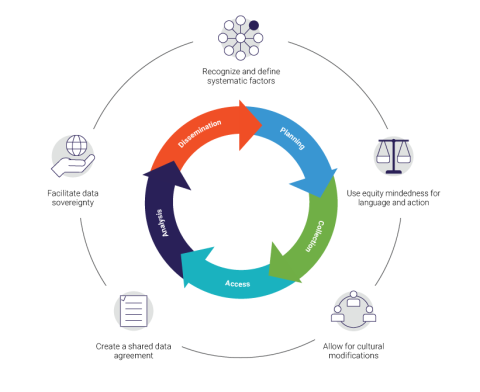DATA: THE BUILDING BLOCKS OF HEALTH
Public health, including funders, project managers and community partners, rely on data when making decisions. Public health data systems need improvement for the data to be a true reflection of everyone’s life experiences and to drive equitable projects. We need equitable data systems to be able to effectively address inequities.
Building Equitable Data in Public Health
Public health needs to shift the conversation. Having community-level participation and voices driving every phase of the data life cycle is pivotal to creating more equitable public health data systems. The CDC Foundation, with insights from the CDC, developed the Principles for Using Public Health Data to Drive Equity, also known as data equity principles, to bring an equity lens to each stage of the data life cycle.
The Five Principles
Recognize and define systemic factors
Recognize and define systemic, social and economic factors that affect individual health outcomes and communities’ ability to thrive.
Use equity-mindedness for language and action
Use equity-mindedness as the guide for language and action in a continual process of learning, disaggregating data and questioning assumptions about relevance and effectiveness.
Allow for cultural modification
Proactively include participants from the communities of interest in research and program design to allow for cultural modifications to standard data collection tools, analysis and sharing.
Create shared data agreement
Collaborate with agencies and the community to generate a shared data development agenda ensuring a plan for data completeness, access and prioritized use to answer high-interest questions.
Facilitate data sovereignty
Facilitate data sovereignty by paving the way for communities to govern the collection, ownership, dissemination and application of their own data.
Integrating the principles throughout the data life cycle
The data equity principles build upon thought leadership and practical applications for creating data systems. The principles offer a shift in thinking as we consider our methods for planning, collecting, accessing, analyzing and disseminating data: How can each of us make more impactful decisions?

We all have a role to play to strengthen and improve public health data. Funders, community partners, program managers and the public all play a pivotal role. Hear from different members of the public health community on the importance of equitable approaches to public health data:
For More Information
For additional details on the Principles for Using Public Health Data to Drive Equity, please email healthequity@cdcfoundation.org.
